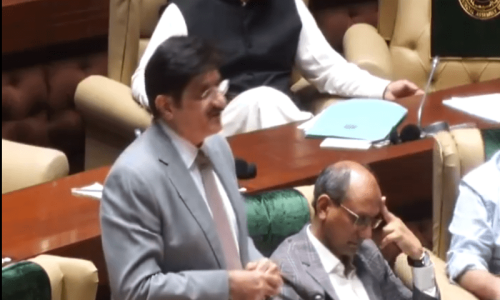
THATTA: Climate change in Pakistan is unleashing more destruction than what wars do. Over 3.5 million acres of land in the coastal areas of Sindh, especially Thatta and Badin districts, have already vanished due to sea erosion.
This was observed by MPA Syed Riaz Hussain Shah Sheerazi at a seminar on climate change and its impacts held here on Tuesday following signing of a memorandum of understanding (MoU) by the Sindh University (SU) and Islamic Relief Pakistan (IRP) on the Thatta campus of the varsity.
MPA Shah that the phenomenon leading to the huge loss of land and livelihood, besides shifting of local communities from the coastal areas to urban and infertile patches over a few decades, was catastrophic. Although sea intrusion and resultant losses appeared natural, it’s somehow a man-made disaster as nothing had been done in this long period to ensure flow of sweetwater into the sea through Indus in the deltaic region. This, he observed, forced indigenous people to migrate from the affected areas.
SU Vice Chancellor Prof Dr Fateh Muhammad Burfat presided over the seminar which was attended by political leaders and activists, members of civil society organisations and university students.
Prof Burfat told the audience that the historical city of Thatta had once been a well developed city and included Karachi as its small tehsil. “It has now shrunk to a desert city due to climate change, which now poses a serious threat to its territory, ecology and demography,” he said.
He said that thousands of graves in Makli belonging to the people of different dynasties made the world believe that prosperity prevailed in this region. “The tombs at Makli are more magnificent than the houses standing today in the area. This is a situation worrisome for all of us,” he said.
SU pro-vice chancellor Prof Dr Rafiq Memon and PPP Thatta district president Sadiq Memon also spoke at the seminar, which was followed by a discussion on environment, climate change, mega projects and other development works being carried out in the coastal areas.
SU registrar Dr Ameer Ali Abro urged lawyers, teachers and other segments of society to come forward and help government evolve the policies that benefit the region and its people.
Advocate Sarmad Iqbal of the IRP noted that universities greately contributed in promoting research and suggesting ways to policy-makers. He said that in order to fight climate change impacts, people were required to change their behaviour towards environment and help curb pollution.
He said that the MoU signed today with the SU would enable the two institutions to explore opportunities for chalking out joint programmes and engage youth and policy-makers in this regard.
Prof Dr Mukhtiar A. Mahar, Khuda Bux Behrani and Haroon Bakari also shared their views on climate change with other participants of the discussion.
Published in Dawn, January 8th, 2020














































Dear visitor, the comments section is undergoing an overhaul and will return soon.